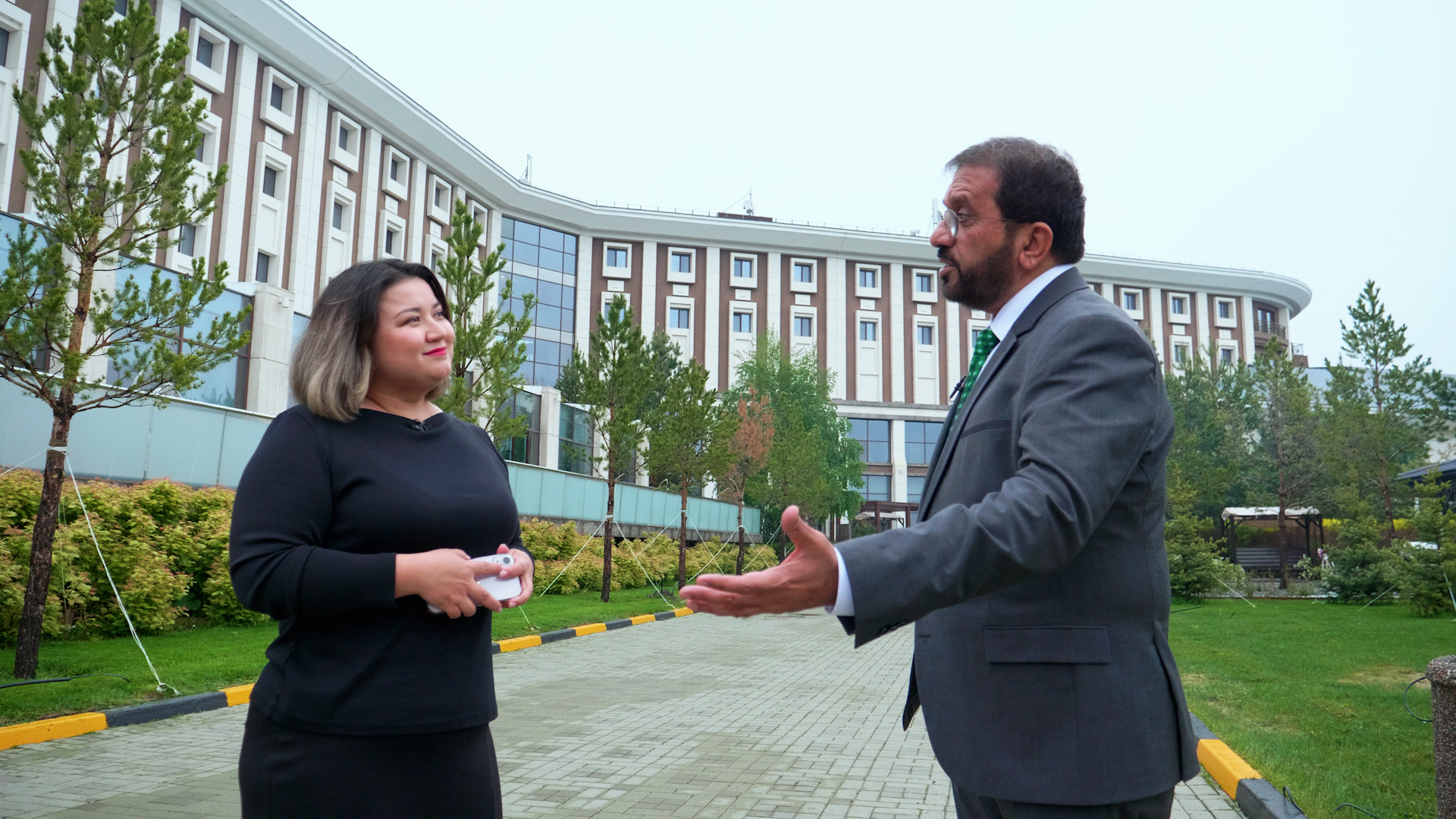ASTANA — With abundant wind and sun resources, Kazakhstan has the perfect recipe for transitioning to renewable energy, said Abid Malik, the Geo Head of Central Asia at ACWA Power, during The Astana Times YouTube interview on the sidelines of QazaqGreenFest on May 30-31 in Burabay, the Akmola Region.

Abid Malik, the Geo Head of Central Asia at ACWA Power, spoke to The Astana Times correspondent Aida Haidar on the sidelines of QazaqGreenFest in Burabay on May 30. Photo credit: The Astana Times.
Malik noted that based on a study by the Asia Wind Energy Association, Kazakhstan has the potential to generate 760 gigawatts of wind power.
“In addition to its wind resources, Kazakhstan benefits from ample sunlight, making it ideal for solar power generation. With efficient government tools in place, the country is well-equipped to implement its energy transition program,” he said.
Many countries possess the ability or resources for renewable energy but lack the necessary tools to attract investors. Highlighting the challenges many countries face in attracting renewable energy investors, Malik stressed the importance of broader support beyond investors.
“It is not just about investors,” Malik emphasized. “Various other factors must also support the energy transition program for success. For instance, having investors is not enough if there are no lenders. Similarly, even with investors and lenders, without government support, implementation becomes challenging.”
Malik lauded Kazakhstan’s conducive environment for investment, highlighting the favorable conditions and noting the existence of enthusiasm, resources, and investors such as himself. He also reiterated the interest of international financial and development institutions in backing renewable implementation initiatives in the country.
“That itself is a demonstration of how the government and the business community are becoming investment-friendly. At the same time, this is attracting not only investors and lenders but also a lot of international contractors to come and look into different other sectors,” he said.
Elaborating on the investment climate and interactions between the business community and government officials while collaborating with Kazakhstan, Malik noted the willingness and positive attitude towards investors.
“This attractiveness is not limited to just one investor or financial institution; numerous investors and developers, including ourselves, are eager to invest. When the government, business community and ministries understand investor and lender needs and provide the necessary tools, it fosters mutual interest. Credit for this favorable environment largely goes to the country’s leadership, including President Tokayev, and the supporting ministries for their prompt decision-making and assistance in facilitating investments,” he said.
Discussing the implications of the agreement between Kazakhstan and Saudi Arabia to establish a wind power plant, Malik emphasized the project’s broader objectives in renewable energy, innovation, and combating climate change. In March of 2023, an agreement was signed between the Kazakh Ministry of Energy, Samruk Kazyna Sovereign Wealth Fund, and ACWA Power, the world’s largest private desalination company, to construct a one-gigawatt wind farm in the Zhetysu Region. Construction is set to commence in 2025.
He highlighted its alignment with the countries’ energy security priorities and transition commitments, as well as the project’s role in supporting Kazakhstan’s energy security goals, emissions reduction targets, and pursuit of carbon neutrality by 2060.
“These programs aim to implement the project in Kazakhstan in the field of renewable energy, innovation, combating global warming and promoting projects that contribute to achieving the goals, priorities and commitments of both countries in the area of energy security and transition. The program also contributes to supporting Kazakhstan’s endeavors to achieve its goals and policies in the field of energy security and emission reduction, including achieving carbon neutrality by 2060,” he said.
Malik underscored the project’s potential to spur regional industrial development, economic growth, infrastructure enhancement, and business activity while promoting affordable and clean energy access. He disclosed ongoing studies at the project site, including environmental, social, and engineering assessments necessitated by the area’s high wind speeds.
“Various engineering studies are required. As I am sure you know, the wind speed is very high at that specific site. So, we have to do a lot of studies to prepare ourselves for the engineering and design of the project,” he said.
Malik outlined the project timeline, aiming for construction commencement in the second half of 2025 and power generation by the latter half of 2028. For a project of this scale, the estimated construction duration is expected to last 36 months.
For the complete conversation, stay tuned for the release of the full video interview on The Astana Times’ YouTube channel this June.
